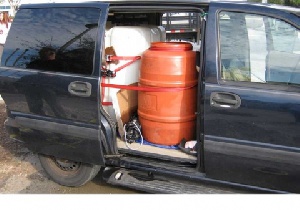THE Ghana Revenue Authority (GRA) has identified the South -Western and North-Western borders of the country as areas where smuggling of goods across water bodies are common.
This sad development has come as a blow to the GRA’s core mandate of protecting revenue by preventing smuggling.
The GRA personnel physically patrol the borders and other strategic points; examine goods as well as related documents, but lack of required equipment to execute this mandate has resulted in the increased smuggling in the aforementioned areas. This development has resulted in the nation losing millions of Ghana cedis through the illegal trade.
According to GRA, though it was working hard to arrest the problem of smuggling of goods across our water bodies, the execution of the mandate has not been easy especially looking at the vast area they are complaining about. The GRA has, therefore, fallen on the Naval and Marine police to assist in curtailing the smuggling.
The Assistant Commissioner of GRA in charge of Public Affairs, Mr. Robert Nana Mensah who disclosed this in an exclusive interview with The Chronicle after a day’s workshop held for Journalists, noted that apart from the regular dutiable goods, they are also smuggling arms, illegal drugs, as well as human beings, due to the absence of the GRA patrol personnel and the security agencies.
The Assistant Commissioner, who could not tell how much the nation, loses as a result of the nefarious activities, cautioned traders to desist from using unapproved routes to bring goods into the country.
Earlier, the GRA organized a workshop for Journalists on the importance of understanding customs procedures, which was participated in by journalists drawn from both the print and the electronic media houses in Takoradi. The workshop educated participants about the need to understand the customs procedures.
Mr. Robert Nana Mensah took journalists through the customs procedures and laws governing the GRA. The GRA Commissioner explained the rationale behind the tax reforms in Ghana.
On the Freezone system, he explained that Freezone enterprises may be sited at designated enclaves or scattered as single enterprises at various locations. He said in Ghana, the priority sectors included Information and Communication Technology, Manufacturing and Sea processing amongst others.
He said the regulatory authority of the Freezones was the Ghana Freezone Board operating under the Freezone Act 618. He added that the interest of customs in Freezone activities has also been occasioned by the entry of duty-free consignment and the potential abuse of the regime and resultant revenue loss.
Regional News of Wednesday, 8 October 2014
Source: The Chronicle

















